Discover How to Continue with BLW During the Holidays – An Interview with Sara from @habiaunavez
Holidays are a wonderful opportunity to relax and enjoy time with your family, although they can present challenges if you have a baby and practice BLW (Baby-Led Weaning). However, this feeding method has many advantages when travelling. If you are in this stage and looking for advice, keep reading. We interviewed Sara Abella, a BLW advisor and author of the blog "Había una vez", to review what to keep in mind to continue with BLW during holidays. You will find practical tips to adapt to obstacles and take advantage of the opportunities that travel offers for learning and complementary feeding.
What is BLW?
First, let’s recall with Sara from @habiaunavez what BLW is: “For those unfamiliar with the term, BLW or Baby Led Weaning is an approach to complementary feeding where the baby, from 6 months, starts eating solid foods by themselves, without going through the puree stage. The baby sits at the table with the family and explores the food with their own hands, promoting autonomy and confidence in their eating abilities.”
This way of eating also promotes the development of fine motor skills and teaches them to regulate their appetite by adjusting their food intake according to their needs.
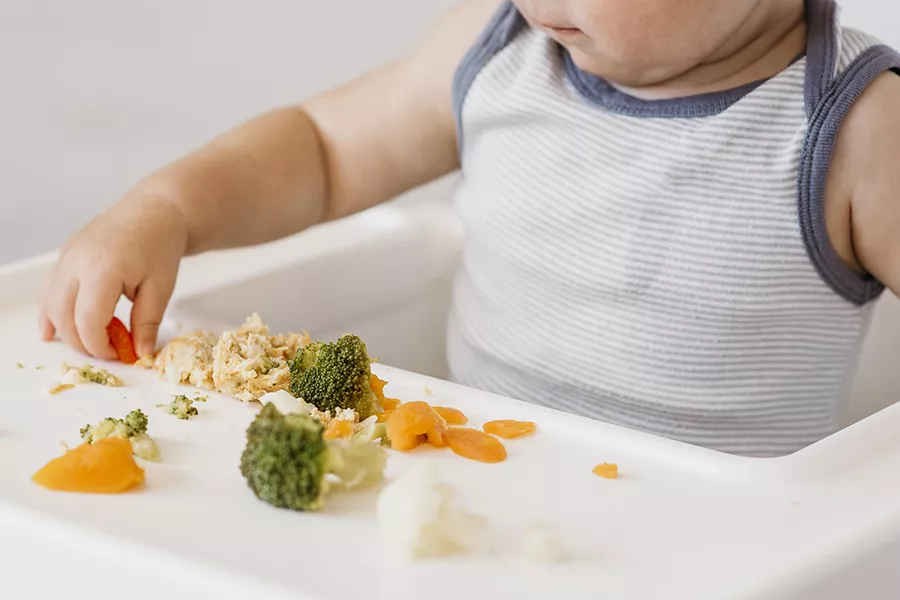
Benefits of BLW During Holidays
BLW can be especially beneficial during holidays for several reasons. First, it provides flexibility in meals, as there is no need to prepare special foods for the baby – they can eat the same as the rest of the family. This not only simplifies meal logistics but also allows the baby to fully participate in family culinary experiences, “making meals more enjoyable and less stressful,” adds Sara.
“Additionally, it promotes flexibility and adaptation to new environments and meals, which is a great advantage during travels.” Indeed, holidays offer a unique opportunity for your baby to explore new flavours and local foods. Trying different types of food can be an enriching experience that fosters curiosity and acceptance of a varied diet.
Tips for Continuing BLW During Holidays
To maintain BLW during holidays, planning is essential. According to Sara, “it’s important to ensure access to fresh and healthy foods. It’s also helpful to bring along some basic utensils such as baby plates and cutlery, as well as airtight containers for storing food.” Depending on your holiday destination, it might be useful to find out which local foods you can offer your baby.
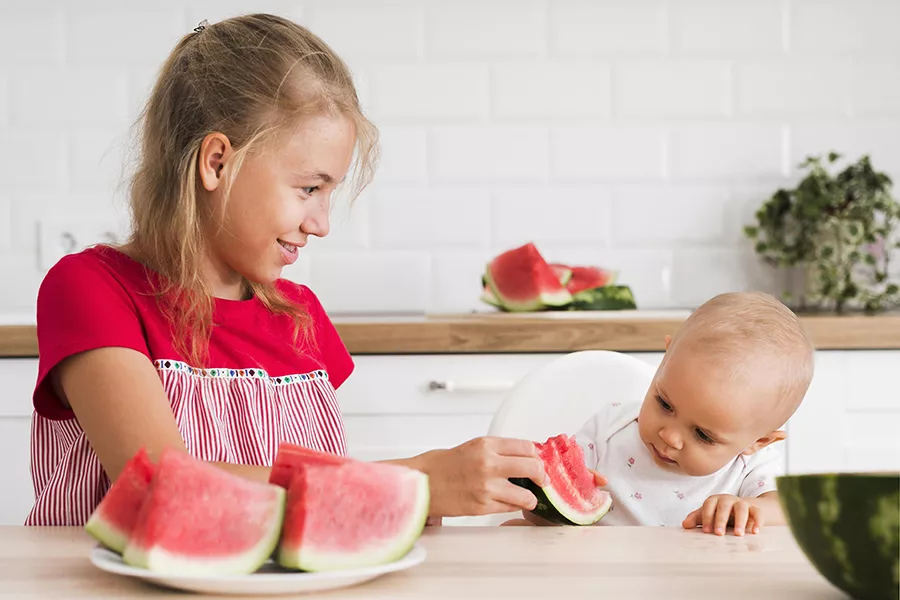
Another important key is maintaining routines. Even if you’re on holiday, trying to keep meal times similar to those at home can make your baby feel more comfortable and secure.
Important Precautions for BLW During Holiday
During holidays, the precautions to take are the same as at home, although you might need to be a bit more attentive since you cannot control the environment as much.
For example, maintaining good hygiene to ensure that food and utensils are clean is crucial, especially when you are in public places. It’s essential to follow the usual food safety recommendations, avoiding foods that could present a choking risk. “Additionally, it can be challenging to keep food at the right temperature, especially in warm climates,” Sara adds.
It’s also important to be cautious with allergens, especially when introducing new foods. While it is recommended to introduce new foods in a controlled manner to help identify and manage potential allergic reactions appropriately, we suggest not doing so during holidays, and leaving it for after the trip. This way, you will feel more comfortable in the controlled environment of your home. The easiest way is to avoid processed foods: for example, artisanal ice creams may contain raw egg, sauces may contain allergens, vegetable soups or veloutés may contain cream…
We will follow the same recommendations when dining out, as Sara explains: “When choosing from a restaurant menu, we look for dishes that include fresh and natural ingredients, avoiding highly processed foods or those with excess salt and sugar. We usually avoid ordering ‘children’s menus’ as they are generally not the most suitable. We prefer to order dishes that we can share.”
Ideally, always prioritise dishes with ingredients in their most natural form: roasted vegetables, grilled meat, raw fruit that you can offer in safe cuts... Vigilance and attention to your baby's signals are essential for a safe and positive BLW experience during holidays.
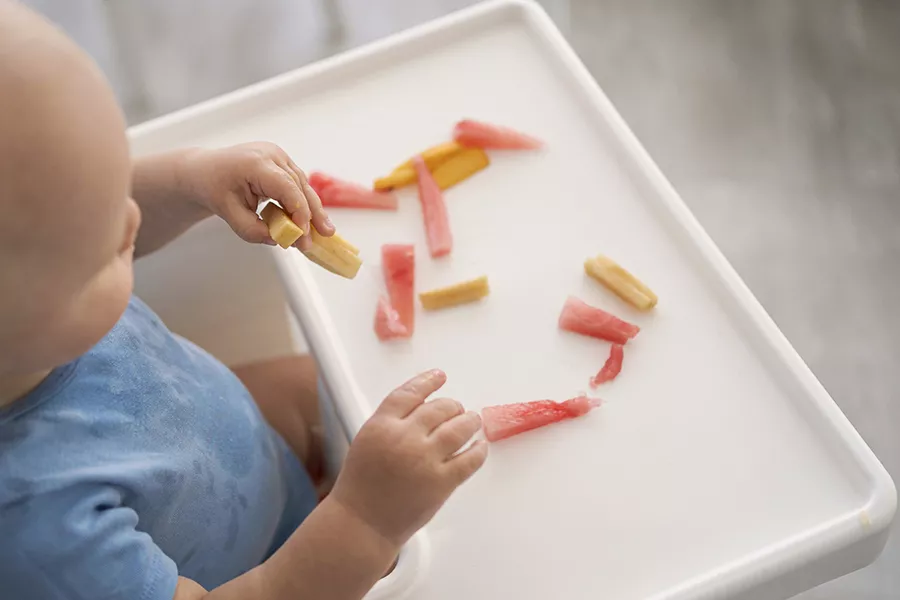
Adapting BLW to Different Holiday Destinations
In addition to the points above, each holiday destination presents its own challenges and opportunities for BLW. For example, at the beach, it’s ideal to bring healthy and easy-to-handle snacks like cut-up fruits and vegetables. These foods are not only nutritious but also easy to consume without the need for complicated utensils.
In the mountains, opting for foods that are easy to transport and don’t require immediate refrigeration can be very helpful. Homemade cereal bars, for example, are an excellent option. These foods are not only practical but also provide the necessary energy for outdoor activities.
In Sara’s case, she shares her experience travelling in a caravan: “Travelling in a caravan has given us a lot of flexibility in applying BLW. We can cook our own food and maintain a balanced diet without depending on external options. However, we have had to adapt some aspects, such as food storage and managing the space in the caravan kitchen.”
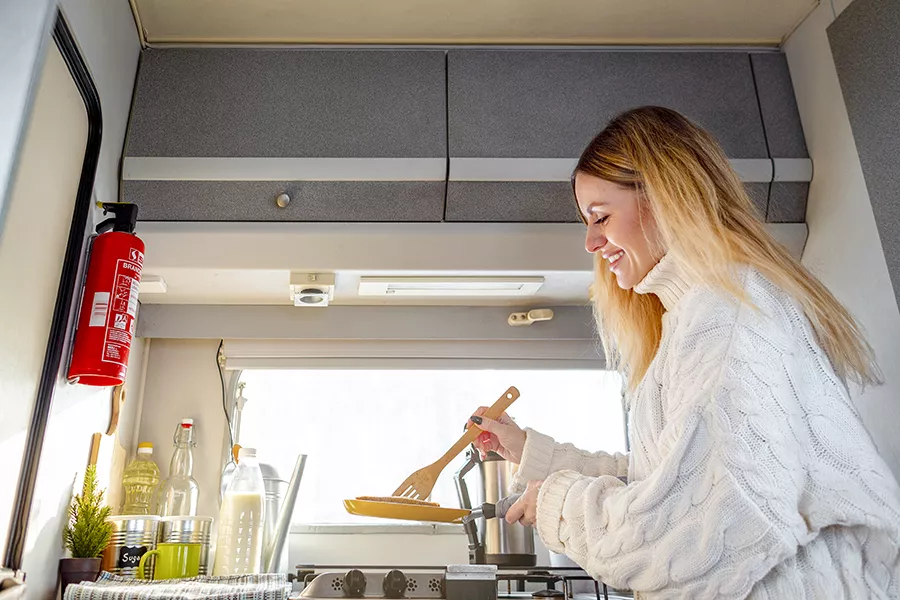
Additionally, it’s important to think about whether you need dishes or items for your baby, like Sara: “we bring specific materials like baby dishes and cutlery that are easy to clean and transport. We also bring a small portable fridge to keep food fresh and some basic ingredients that we know our baby enjoys and are easy to prepare.”
Fun Activities to Promote BLW During Holidays
Holidays can be an excellent opportunity to promote BLW in creative and fun ways, taking advantage of what the environment or destination offers. Here are some activities to consider depending on your baby’s age.
- Strolling through markets: Colours and aromas can be very stimulating, and it’s an excellent way to introduce your baby to a variety of fresh fruits, vegetables, and other products.
- Organising picnics: Eating outdoors is not only a pleasant experience but also allows the baby to enjoy food in a different and relaxed environment.
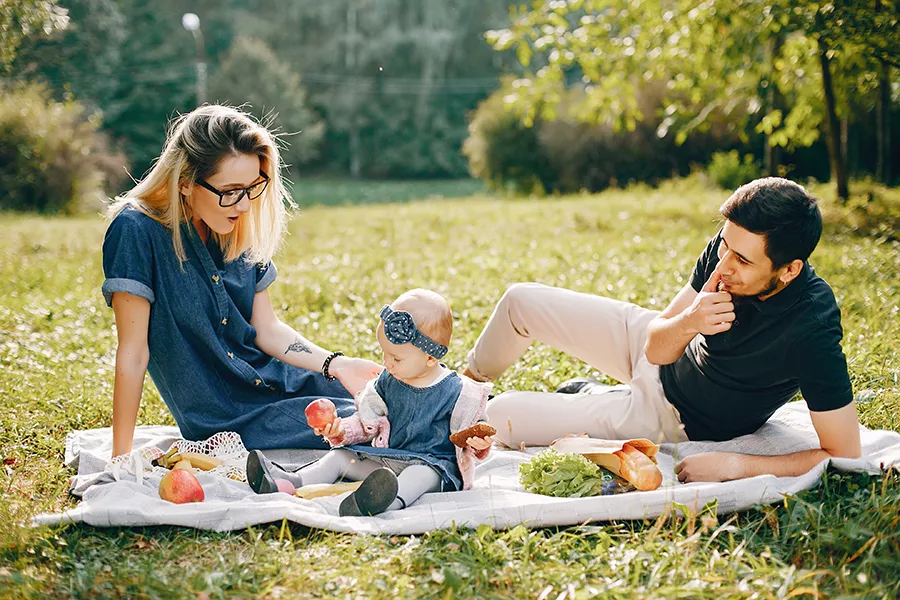
- Creating simple games: For example, making shapes with fruits and vegetables can also be an effective way to keep the baby’s interest and make meals more fun.
- Visiting local producers: Take your baby to a local farm to see where food comes from. They can see fruits and vegetables on trees or in the ground, taste olive oil with bread, discover eggs in a henhouse... which can increase their interest in these foods.
- Taking advantage of buffets: If you’re staying somewhere with a breakfast buffet, let your baby explore and choose their own foods (within what is safe). This freedom, as well as the different presentation of foods, can foster independence and curiosity to try new things.
These activities are not only fun and educational but also promote a positive attitude towards eating and can help your baby develop healthy eating habits from an early age.
Easy and Practical Recipes for BLW on Holiday
After these recommendations for safely and playfully promoting BLW during holidays, we’ll suggest some easy recipes. We know that when travelling, it’s not as practical as at home: we don’t have the same ingredients or utensils, and we can’t cook everything we would like.
For Sara, “one of our favourite recipes is a quinoa salad with vegetables. It’s very easy to make, nutritious and delicious for the whole family. You only need cooked quinoa, cherry tomatoes, cucumber, avocado, corn and a bit of olive oil. Mix everything together and you’ll have a healthy meal that both adults and children will enjoy.”
Another recipe to consider, or rather ingredient, is legumes. Lentils, or beans for example, can be bought pre-cooked, are easy to store, and can be eaten alone or mixed, and either hot or cold. They are very versatile and nutritionally interesting. A recipe that is easier to handle with hands for babies is lentil bites: mash them with a bit of spices and fry them in a pan, and you’ll have delicious finger foods to eat with the family, accompanied by cooked vegetables or a bit of rice.
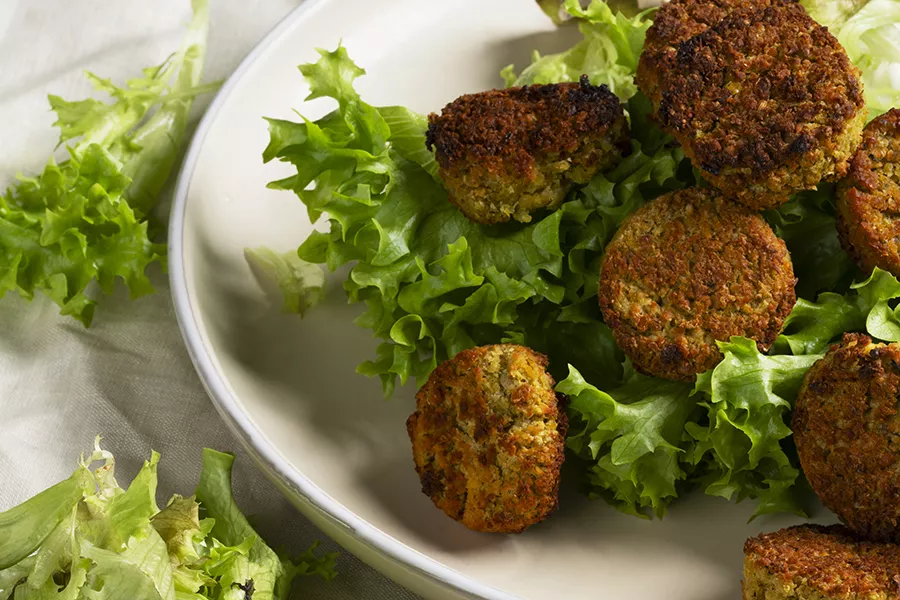
A recipe that cannot be missing is the omelette. If your baby has already tried eggs, you have some easy recipes to make even in a small kitchen like a caravan’s: plain omelette, courgette omelette, pea omelette, scrambled eggs with ham, boiled egg for your salads…
Also highly recommended are banana and oat bites for healthy snacks. To prepare them, mix mashed banana with oats, form small balls and bake them. These bites are not only nutritious but also easy to transport and store. If you don’t have an oven, there are variations in the pan: you’ll find the recipe for these banana and oat pancakes on Sara’s blog.
Recommendations for Maintaining a Healthy Feeding Routine During Holidays
We will end this article by recalling some essential recommendations for healthy eating during holidays.
First of all, maintaining hydration is crucial during holidays, especially in warm climates. Make sure your baby drinks enough to stay hydrated.
It is also advisable to avoid processed foods and opt for fresh and natural foods whenever possible. For Sara, when dining out, “we try to choose restaurants that offer healthy options on the menu. However, we always bring something to eat just in case we can’t find anything suitable for our baby. This may include fruits, cooked vegetables, or a healthy snack that we know our baby likes and is safe for them.”
Observing your baby’s hunger and satiety cues is another important part. Respecting your baby’s appetite and not forcing them to eat if they are not hungry can help foster a healthy relationship with food. In fact, it is something we can apply to the whole family: sharing these moments together, being mindful of what we eat without screen distractions, allows us to be more aware of our sensations and develop a healthy relationship with food.
Maintaining a healthy feeding routine during holidays can significantly contribute to the overall well-being of your baby and your family.
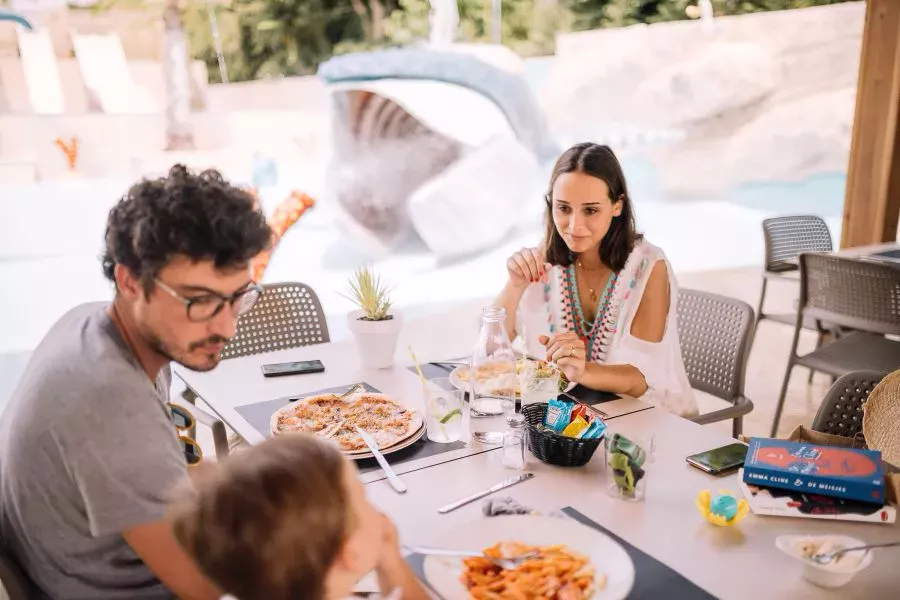
As you’ve seen, holidays do not have to interrupt the BLW process. On the contrary, with a bit of planning and the right tips, you can continue offering your baby healthy and fun food, no matter where you are. Take advantage of this time to explore new flavours and strengthen your baby’s eating habits, creating unforgettable family memories. BLW is not just a feeding method but a way to integrate your baby into family experiences in an active and participatory manner.
We want to thank Sara for sharing her experience with us, helping families enjoy their holidays without worries. In fact, you can read more about her stay at our Sènia Caballo de Mar Campsite when she visited us with her family in their caravan. “I am delighted to share our experience with you and some tips on how to apply BLW while travelling, especially in such a wonderful environment as a campsite. We had incredible days with family and friends at the campsite, it was a very positive experience!” Thank you, Sara!
